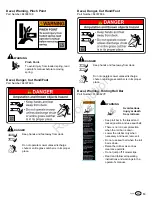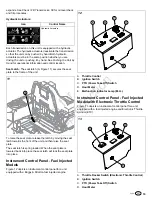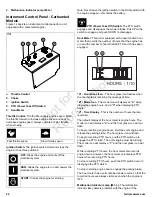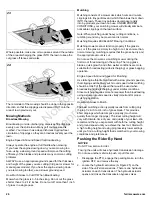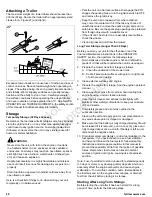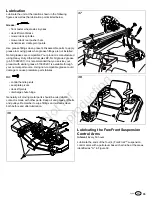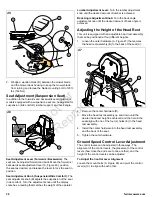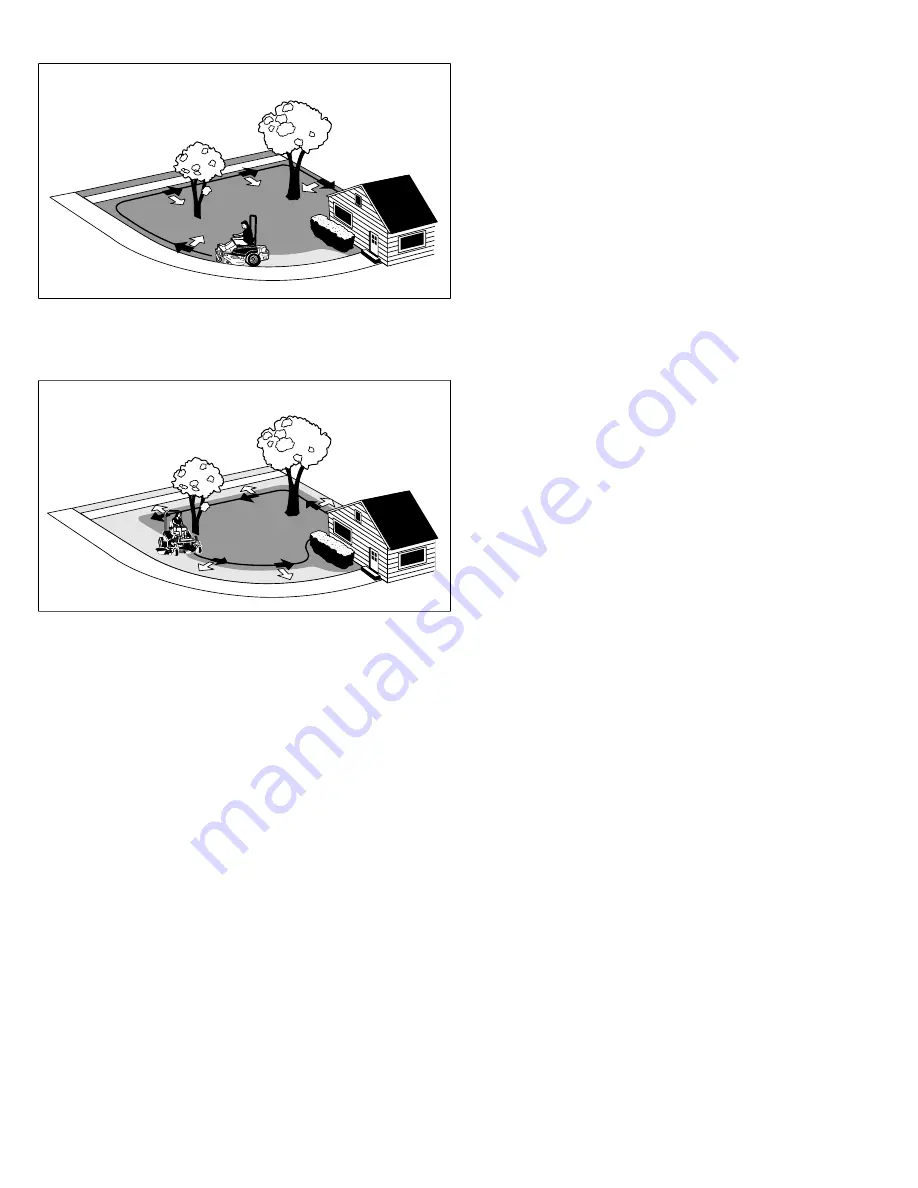
Not for
Reproduction
26
23
Where possible, make one or two passes around the outside
of the area discharging the grass INTO the lawn to keep the
cut grass off fences and walks.
24
The remainder of the mowing should be done in the opposite
direction so that the clippings are dispersed OUT onto the
area of lawn previously cut.
Mowing Methods
Broadcast Mowing
Broadcasting, or side-discharging, disperses fine clippings
evenly over the entire lawn. Many golf courses use this
method. Your mower has a deep dish deck to allow freer
circulation of clippings so they are broadcast evenly over the
lawn.
Engine Speed & Ground Speed for Broadcasting:
Always operate the engine at full throttle when mowing.
If you hear the engine slowing down, you are mowing too
fast—using a slower ground speed will improve the cutting
efficiency of the blades and prevents many common cutting
problems.
ALWAYS use an appropriate ground speed for the thickness
and height of the grass you are cutting (3rd gear or slower for
manual gear models). If you hear the engine slowing down
you are mowing too fast, use a slower ground speed.
How Much Grass to Cut Off When Broadcasting:
Mow when the grass is 3-5 inches long. Do not cut the grass
shorter than 2 to 2-1/2 inches. Do not cut off more than 1 inch
of grass in a single pass.
Mulching
Mulching consists of a mower deck which cuts and re-cuts
clippings into tiny particles and which then blows them down
INTO the lawn. These tiny particles decompose rapidly
into by-products your lawn can use. UNDER PROPER
CONDITIONS, your mulching mower will virtually eliminate
noticeable clippings on the lawn surface.
Note:
When mulching under heavy cutting conditions, a
rumbling sound may be present and is normal.
Mulching Requires EXCELLENT Mowing Conditions:
Mulching mowers cannot function properly if the grass is
wet, or if the grass is simply too high to cut. Even more than
normal mowing, mulching requires that the grass be dry and
the appropriate amount is cut.
Do not use the mower as a mulching mower during the
first two or three mowings in the spring. The long grass
blades, quick growth, and often wetter conditions are more
suitable for broadcasting (side-discharging) or grass bagging
operation.
Engine Speed & Ground Speed for Mulching:
Use full engine throttle matched with a slow ground speed so
that clippings will be finely cut. Ground speed while mulching
should be HALF of the speed that would be used when
broadcasting (side discharging) under similar conditions.
Since mulching requires more horsepower than broadcasting,
using a slower ground speed is vitally important for proper
mulching operation.
How Much Grass to Mulch:
The best mulching action typically results from cutting only
the top 1/2 inch to 3/4 inch of grass blade. This provides
short clippings which decompose properly (much more
quickly than longer clippings). The ideal cutting height will
vary with climate, time of year, and quality of your lawn. We
recommend that you experiment with both the cutting height
and ground speed until you achieve the best cut. Start with
a high cutting height and using progressively lower settings
until you find a cutting height that is matched to your mowing
conditions and preferences.
Pushing the Rider By Hand
NOTICE
Do NOT tow zero-turn rider.
Towing the units will cause hydraulic transmission damage.
Do not use another vehicle to push or pull this unit.
1. Disengage the PTO, engage the parking brake, turn the
ignition OFF, and remove the key.
2. Locate the hydraulic actuators (A, Figure 25) on the
side of the unit's transmissions. There is one hydraulic
actuator on each transmission. The hydraulic actuator
opens and closes the transmission bypass valves.


